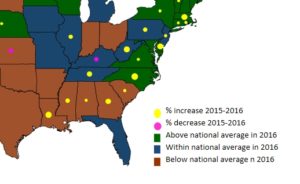April 21, 2017
21 Apr 2017
Posted by Andrew Kantor
It’s two, two, two epidemics in one
BuzzFeed News* explains how the ‘painkiller epidemic’ in the U.S. is actually two separate but equally important events: Prescription painkillers are hitting the middle-age and older crowd, while heroin is killing the young.
- Not to be confused with plain ol’ BuzzFeed, home of click-bait lists
There is no headline I can use here that the boss will approve
Remember Addyi, aka flibanserin, the “female Viagra” that never really caught on? It’s still out there — and now it’s appearing in those creepy OTC supplements we like to make fun of (e.g., LabidaMAX, Monkey Business).
Are you ready for the next pandemic?
The latest National Health Security Preparedness Index is out — it measures how well states (and the country) are prepared for a public health emergency.
It took into account factors such as detecting health threats early; communication between government, community, and individuals; and healthcare delivery.
The good news: “Consistent National Progress: The U.S. posted a fourth consecutive year of gains in health security for disease outbreaks, disasters and other large-scale health emergencies.”
The not-as-good news: We’re still behind the rest of the developed world.
The bad news: If something happens in Georgia, head to North Carolina. We’re below average, N.C. is above it.
Georgia hospitals and the economy
Georgia hospitals play a huge role in the state’s economy. How big? To the tune of bringing $47.8 billion each year in the form of healthcare spending and jobs.
Despite that, according to the latest DCH figures, almost half of all hospitals — and more than two-thirds of rural ones — lost money in 2015, mostly due to uncompensated care. And that’s expected to increase in the future.
Remember to check out our insurance products
The enrollment window for GPhA’s voluntary insurance — life, accident, and critical illness products, offered through UNUM — is open through April 28.
Look for your e-mail from Enroll VB or visit EnrollVB.com/GPhA.
These policies supplement your medical coverage — they take care of things your medical plan does not cover. Check ’em out!
Tomorrow, eye of newt
Yesterday it was an anti-viral from frog mucus. Today it’s an antibiotic from dragon’s blood. Really.




